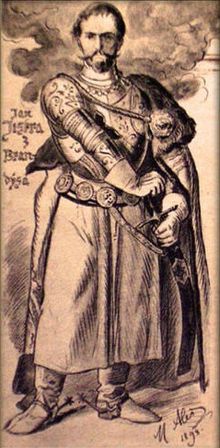| Revision as of 21:10, 11 April 2013 editNorden1990 (talk | contribs)Extended confirmed users50,600 edits He was Hungarian noble of Czech origin← Previous edit | Revision as of 15:23, 28 October 2014 edit undoWaacstats (talk | contribs)Autopatrolled, Extended confirmed users, Pending changes reviewers1,348,587 edits PersondataNext edit → | ||
| Line 16: | Line 16: | ||
| | NAME = Giskra, John | | NAME = Giskra, John | ||
| | ALTERNATIVE NAMES = | | ALTERNATIVE NAMES = | ||
| | SHORT DESCRIPTION = | | SHORT DESCRIPTION = Czech merchant | ||
| | DATE OF BIRTH = | | DATE OF BIRTH = | ||
| | PLACE OF BIRTH = | | PLACE OF BIRTH = | ||
Revision as of 15:23, 28 October 2014
You can help expand this article with text translated from the corresponding article in German. (December 2009) Click for important translation instructions.
|
You can help expand this article with text translated from the corresponding article in Hungarian. (June 2010) Click for important translation instructions.
|

Jan Jiskra z Brandýsa (Template:Lang-de; Template:Lang-hu) (c. 1400 – c. 1469), in English sometimes referred as John Giskra, was a Czech strategist and mercenary soldier.
Early life
Jan Jiskra came from the Moravian branch of the noble family Páni z Brandýsa (Lords of Brandýs), he was possibly a son of Alšík z Brandýsa.
Jiskra spent his youth in Bohemia and partially also in Italy, where he - according to several sources - attended the battles of the Republic of Venice. In the Czech lands he became familiar with the Hussite war strategies. Following the Battle of Lipany Jiskra, together with other Hussite soldiers, joined the army of the Emperor Sigismund of Luxembourg and fought with Turkish troops in the region of Belgrade.
References
- Václav Chaloupecký: Jiskra z Brandýsa: Tvůrcové dějin 2, Prag 1934
- Jan Jiskra z Brandýsa a politický zápas Habsburků s Jagellovci o Uhry v letech 1440-42: Historické štúdie 3, Bratislava 1957
This Czech biographical article is a stub. You can help Misplaced Pages by expanding it. |
This Czech history–related article is a stub. You can help Misplaced Pages by expanding it. |
This Hungarian history article is a stub. You can help Misplaced Pages by expanding it. |